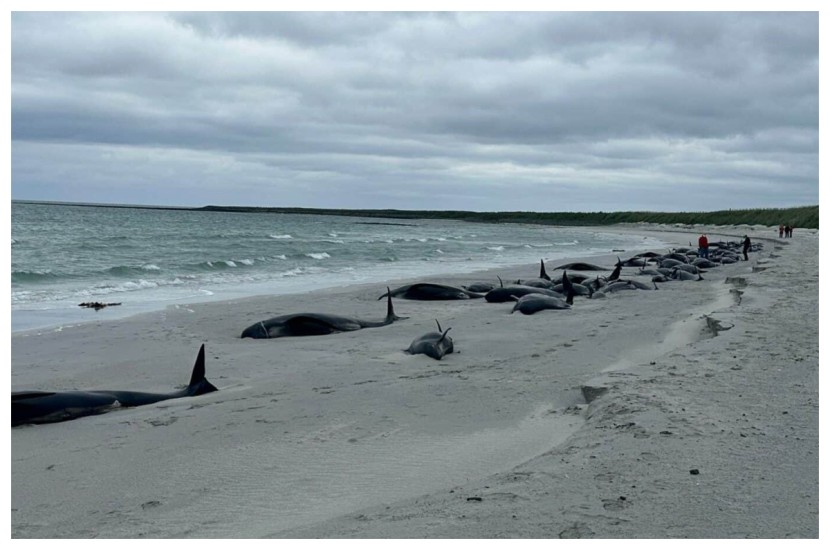
After 12 of 77 pilot whales stranded on a Scottish beach on Thursday were initially found alive, rescuers said in an update that they had to be euthanized due to their condition deteriorating after too many hours stuck on shore.
At around 10:45 a.m. Thursday, British Divers Marine Life Rescue received a report that there were up to 100 long-finned pilot whales stranded on Tresness Beach on the island of Sanday in the Orkney archipelago. A team of rescuers mobilized personnel and equipment to travel to the remote island, where they found 77 whales stranded "high up on the beach.
Only a dozen were still alive when medics arrived, after having already been stranded there for several hours.
As wildlife medics made health assessments and provided first aid to the living whales, they waited for the incoming tide to hopefully help them get the animals back out to sea.
In an update later Thursday evening, the organization said the remaining 12 whales had to be euthanized "due to their condition deteriorating."
BDMLR said the whales suffered crush injuries from their own weight while spending so many hours stranded on shore. There was also a "high likelihood" the whales had inhaled water with the incoming tide.
"The substrate they're on is also incredibly soft meaning they have sunk even deeper into the sand when the tide washed over them, so they unfortunately weren't able to refloat themselves," the organization said.
The Scottish Marine Animal Stranding Scheme is attempting to recover as many carcasses as possible for post-mortem sampling and examination to try to uncover the cause of the stranding.
"This is currently unknown as there are no obvious indications as to why they all stranded today," BDMLR said. They said it may be "some time" before full results are available.
"We would like to thank all of our volunteer Marine Mammal Medics who attended this incident along with members of the local community for their efforts in these distressing circumstances," BDMLR said. "Thank you also to all of our supporters who have been sending their heartfelt sentiments to the team, as well as SMASS and other colleagues in the background who have been assisting our rescue coordinators and vets with technical support too."
What Is a Mass Beaching?
Mass beachings, otherwise known as Cetacean strandings, are the phenomenon of dolphins and whales stranding themselves on beaches.
Shallow, sloping shores made of soft sediment can confuse the "echolocation" used by whales and dolphins to find their way around, according to the Whale and Dolphin Conservation.
Another factor might be their use of Earth's magnetic field for navigation. Magnetite crystals, which respond to weak magnetic fields, have been found in the brains and skulls of some whales and dolphins, suggesting a magnetic "sense" that aids immeasurably in their navigation, particularly in deep oceans.
Additionally, bad weather and rough seas, with dirty water and reduced visibility, could confuse whales and dolphins, as noted by the Department of Conservation
Errors while chasing prey in shallow waters are also believed to be a major cause of strandings for orcas and dolphins. Conversely, large predators like orcas may cause other marine mammals to panic and strand.
Approximately 2,000 whale strandings occur globally each year, with the majority ending in the animal's death. However, these events are infrequent enough that they do not pose a significant threat to any particular, reports the Fish and Wildlife Foundation of Florida.
Toothed whales (Odontoceti), which include dolphins, porpoises, and all whales with teeth, are the most frequently affected. These cetaceans often live in large groups with complex social structures. If one member of the group becomes ill or distressed, its calls can lead the rest of the group to follow it to the shore, thus causing a mass stranding.
Orcas occasionally beach themselves on purpose to hunt shoreline seals, waiting for waves to help them return to the sea. This behavior is most commonly observed in pods near Argentina and is thought to be taught to younger orcas by older members of the pod. Unintentional beachings of orcas are very rare.
--with reporting by TMX
© 2025 HNGN, All rights reserved. Do not reproduce without permission.









